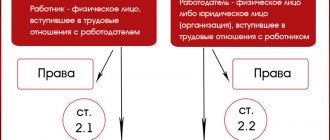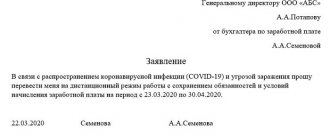Sample documents
Download free current samples of employment contracts with administrators of various institutions.
Article navigation
- Document form
- Contents of the employment contract
- Job responsibilities and rights
- The main responsibilities of the employer
An employment contract is a document that, from the moment of mutual signing, acquires legal force, regulating the beginning, changes and severance of official relations between the employee and the enterprise.
An employment contract with the administrator of a beauty salon or any other company whose activities are aimed at providing services to the population will avoid possible conflicts between the employer and the worker.
The administrator of a fitness club, cafe, hotel, children's center, etc. belongs to the “specialist” category. Therefore, the applicant for this vacancy has qualification requirements: not less than secondary specialized education, previous work experience in this position of at least 1 year.
Tenancy agreement: legal concept
An employee employment agreement is a civil contract, which is considered by law as one of the types of agreement between an individual and an employer. Under the terms of such an agreement, the employer hires an employee to temporarily or one-time perform any work, services, or duties.
Expert opinion
Novikov Oleg Tarasovich
Legal consultant with 7 years of experience. Specializes in criminal law. Member of the Bar Association.
A tenancy agreement signed by the parties is only valid if it includes the essential terms of the agreement. It is in many ways similar to a standard employment contract, but has a number of differences from it, namely:
- the object of the contract can only be the final result of the work or the service provided, and not the systematic performance of labor duties;
- the contract is strictly limited by the terms specified in the contract and cannot be extended or renegotiated;
- payment under the contract is a remuneration and not a fixed set salary;
- this type of contract does not provide for the provision of benefits and social guarantees for the employee - payment of sick leave, vacations, etc.;
- The relationship of the parties within the framework of a rental agreement with an individual is regulated by the norms of not only Labor, but also Civil legislation.
Works or services for which it is permissible to conclude a contract for hiring an employee may include:
- one-time or specific work on landscaping;
- carrying out advertising campaigns;
- organization of public events related to the activities of the enterprise (symposiums, festive meetings, trainings for company employees, etc.);
- transportation of enterprise personnel;
- renovation of office and production premises, etc.
There is no unified form of such an agreement. This gives the employer the right to independently develop a form in which an employment contract with an individual will be drawn up; the sample document must contain all the basic sections - installation data and responsibilities of the parties, the subject of the agreement and the procedure for performing work or services, issues of payment, responsibilities of the parties, conditions for termination of the contract.
The contract is signed in two copies, no later than three calendar days from the moment when the person hired to perform the work began the relevant work.
Document form
According to Decree of the Government of the Russian Federation No. 858 of August 27, 2016, for employment, a standard form of contract is used, drawn up in writing, in two copies. One remains with the head of the organization, the second with the employee. Both documents must be accompanied by the signatures of the parties. In a situation where an employee has begun his duties without formally concluding a contract, the employment contract is considered signed. To avoid administrative penalties that will follow a possible inspection, the contract must be properly executed within 3 days.
Next, you can enter into an employment contract with the administrator of a cafe, hotel, or other organization specializing in the provision of services.
| Job title | Sample employment contract |
| Beauty salon administrator | Download |
| Hotel administrator | Download |
| Cafe administrator | Download |
| System Administrator | Download |
| Fitness club administrator | Download |
| Medical center administrator | Download |
| Children's center administrator | Download |
Employment contract sample general form
Errors in drawing up or filling out a rental agreement can lead to undesirable consequences for both the employer and the individual - the emergence of claims, financial and labor disputes involving the courts.
To avoid such precedents, we recommend downloading the employee employment agreement and using it for signing by the parties at the conclusion. The given sample agreement provides for all the basic essential conditions that should be included in it, as well as the aspects of responsibility, rights and obligations of the parties.
Contents of the employment contract
In Art. 57 of the Labor Code of the Russian Federation indicates information that must be reflected in the contract:
- Full name of the employee;
- Name of the organization;
- passport details of the employee and employer, if he is an individual;
- TIN of the parties;
- date and place where both parties put the facsimile.
Information directly related to the employee’s professional activities is also indicated:
- job descriptions;
- work and rest schedule;
- working conditions, wages in terms of calculation and size;
- start date of employment (in the case of concluding a fixed-term contract, the duration is indicated);
- working conditions;
- guarantees that the contract offers.
The clause “job descriptions” should be disclosed as much as possible in the employment contract.
Employment contract with the administrator (indefinite; subject to a probationary period)
EMPLOYMENT AGREEMENT N ___ with the administrator (indefinite; subject to a probationary period)
___________________ “___”__________ ____ city _______________________________________________, hereinafter referred to as (name of organization) “Employer”, represented by ______________________________________, acting___ (position, full name) on the basis of ___________________, on the one hand, and _____________________, ( Full name) hereinafter referred to as ____ “Employee”, on the other hand, have entered into this agreement on the following: 1. SUBJECT OF THE AGREEMENT 1.1.
The Employer instructs, and the Employee assumes, the performance of labor duties in the position of administrator in __________________________________________. (name of structural unit) 1.2. The work under this agreement is the main one for the Employee. 1.3. The Employee’s place of work is ____________ at the address: _______________________.
1.4. The Employee’s work under this agreement is carried out under normal conditions. The Employee’s labor duties are not related to performing heavy work, work in areas with special climatic conditions, work with harmful, dangerous and other special working conditions.
1.5. The employee reports directly to ___________________________________.
1.6. In order to verify the Employee’s suitability for the position held, as well as his attitude to the work entrusted to him, a probationary period of ___ (___________) months is established from the date of commencement of work specified in clause 2.1 of this agreement.
CONTRACT TIME
2.1. The employee must begin performing his job duties from “___”____________ ____.
2.2. This agreement is concluded for an indefinite period.
CONDITIONS OF PAYMENT FOR EMPLOYEES
3.1. For the performance of labor duties, the Employee is set an official salary in the amount of ________ (________) rubles per month.
3.2. The employer establishes incentives and compensation payments (additional payments, allowances, bonuses, etc.). The amounts and conditions of such payments are determined in the Regulations on bonus payments to employees “______________”, which the Employee was familiarized with when signing this agreement.
3.3. If the Employee, along with his main job, performs additional work in another position or performs the duties of a temporarily absent employee without being released from his main job, the Employee is paid an additional payment in the amount established by agreement of the parties.
3.4. Overtime work is paid for the first two hours of work at time and a half, for subsequent hours - at double rate. At the Employee's request, overtime work, instead of increased pay, may be compensated by providing additional rest time, but not less than the time worked overtime.
3.5. Work on a day off or a non-working holiday is paid in the amount of a single part of the official salary per day or hour of work in excess of the official salary, if work on a day off or a non-working holiday was carried out within the monthly standard working time, and in the amount of a double part of the official salary per day or hour work in excess of the official salary, if the work was performed in excess of the monthly working hours. At the request of an Employee who worked on a day off or a non-working holiday, he may be given another day of rest. In this case, work on a weekend or a non-working holiday is paid in a single amount, and a day of rest is not subject to payment.
3.6. The Employee's wages are paid by issuing cash at the Employer's cash desk (by transferring to the Employee's bank account) every six months on the day established by the Internal Labor Regulations.
3.7. Deductions may be made from the Employee's salary in cases provided for by the legislation of the Russian Federation.
VACATION. WORKING AND REST TIME MODE 1
4.1. The employee has a five-day work week with two days off - _______________________ 1.
4.2. Start time: _________________________________ 1 .
Closing time: ______________________________ 1.
4.3. During the working day, the Employee is given a break for rest and food from ___ hour to ____ hour, which is not included in working hours 1.
4.4. The employee is granted annual paid leave of ___ (at least 28) calendar days.
The right to use vacation for the first year of work arises for the Employee after six months of his continuous work with this Employer. By agreement of the parties, paid leave may be provided to the Employee before the expiration of six months. Vacation for the second and subsequent years of work can be granted at any time of the working year in accordance with the vacation schedule.
4.5. For family reasons and other valid reasons, the Employee, on the basis of his written application, may be granted leave without pay for the duration established by the labor legislation of the Russian Federation and the Internal Labor Regulations “_____________________”.
RIGHTS AND OBLIGATIONS OF AN EMPLOYEE
5.1. The employee is obliged:
5.1.1. Conscientiously perform the following duties:
— carry out work on effective and cultural service to visitors, creating comfortable conditions for them;
— ensure control over the safety of material assets;
— advise visitors on issues related to the services provided;
— take measures to prevent and eliminate conflict situations;
— consider claims related to unsatisfactory service to visitors, carry out the necessary organizational and technical measures;
— exercise control over the appropriate design of the premises, monitor the placement, updating and condition of advertising inside the premises and on the building;
- ensure cleanliness and order in the premises and the area adjacent to it or the building;
— monitor compliance by subordinate employees with labor and production discipline, labor protection rules and regulations, industrial sanitation and hygiene requirements;
— inform management about existing shortcomings in serving visitors and measures taken to eliminate them;
— ensure that employees comply with the instructions of the organization’s management.
5.1.2. Comply with the Internal Labor Regulations “____________” and other local regulations of the Employer.
5.1.3. Maintain labor discipline.
5.1.4. Comply with labor protection and occupational safety requirements.
5.1.5. Treat the property of the Employer and other employees with care.
5.1.6. Immediately inform the Employer or immediate supervisor about the occurrence of a situation that poses a threat to the life and health of people, the safety of the Employer’s property.
5.1.7. Do not give interviews, conduct meetings or negotiations regarding the activities of the Employer without prior permission from management.
5.1.8. Do not disclose information that constitutes a trade secret of the Employer. Information that is a trade secret of the Employer is defined in the Regulations on Trade Secrets “____________________”.
5.1.9. By order of the Employer, go on business trips in Russia and abroad.
5.2. The employee has the right to:
5.2.1. Providing him with the work stipulated by this agreement.
5.2.2. Timely and full payment of wages in accordance with your qualifications, complexity of work, quantity and quality of work performed.
5.2.3. Rest, including paid annual leave, weekly days off, non-working holidays.
5.2.4. Compulsory social insurance in cases provided for by federal laws.
5.2.5. Other rights established by the current legislation of the Russian Federation.
RIGHTS AND OBLIGATIONS OF AN EMPLOYER
6.1. The employer is obliged:
6.1.1. Comply with laws and other regulations, local regulations, and the terms of this agreement.
6.1.2. Provide the Employee with work stipulated by this agreement.
6.1.3. Provide the Employee with equipment, documentation and other means necessary to perform his job duties.
6.1.4. Pay the wages due to the Employee on time and in full, as well as make other payments within the time limits established by the Internal Labor Regulations.
6.1.5. Provide for the Employee’s everyday needs related to the performance of his job duties.
6.1.6. Carry out compulsory social insurance for the Employee in the manner established by federal laws.
6.1.7. Familiarize the Employee with all local regulations related to the Employee’s professional activities.
6.1.8. Perform other duties established by the current legislation of the Russian Federation.
6.2. The employer has the right:
6.2.1. Encourage the Employee for conscientious, effective work.
6.2.2. Require the Employee to fulfill his job duties as defined in this agreement, to take care of the property of the Employer and other employees, and to comply with the internal labor regulations.
6.2.3. Bring the Employee to disciplinary and financial liability in the manner established by the current legislation of the Russian Federation.
6.2.4. Adopt local regulations.
6.2.5. Conduct certification of the Employee in accordance with the Certification Regulations in order to identify the real level of professional competence of the Employee.
6.2.6. Conduct an assessment of the Employee’s performance in accordance with the Regulations on Labor Performance Assessment.
6.2.7. With the consent of the Employee, involve him in the performance of certain tasks that are not part of the Employee’s job responsibilities.
6.2.8. With the consent of the Employee, involve him in performing additional work in a different or the same profession (position) for an additional fee.
6.2.9. Exercise other rights provided for by the current legislation of the Russian Federation and local regulations.
EMPLOYEE SOCIAL INSURANCE
7.1. The employee is subject to social insurance in the manner and under the conditions established by the current legislation of the Russian Federation.
GUARANTEES AND COMPENSATIONS
8.1. During the period of validity of this agreement, the Employee is subject to all guarantees and compensations provided for by the labor legislation of the Russian Federation, local acts of the Employer and this agreement.
RESPONSIBILITY OF THE PARTIES
9.1. A party to a contract guilty of violating labor legislation and other regulatory legal acts containing labor law norms is liable in cases and in the manner established by the Labor Code of the Russian Federation and other federal laws.
9.2. The financial liability of a party to a contract arises for damage caused by it to the other party to the contract as a result of its culpable unlawful behavior.
9.3. In cases provided for by law, the Employer is obliged to compensate the Employee for moral damage caused by unlawful actions and/or inaction of the Employer.
9.4. Each party is required to prove the amount of damage caused.
TERMINATION OF THE AGREEMENT
10.1. The grounds for termination of this employment contract are:
10.1.1. Agreement of the parties.
10.1.2. Termination of an employment contract at the initiative of the Employee. In this case, the Employee is obliged to notify the Employer no later than two weeks before the expected date of termination of this agreement. The specified period begins the next day after the Employer receives the Employee’s resignation letter.
10.1.3. Termination of an employment contract at the initiative of the Employer.
10.1.4. Other grounds provided for by the labor legislation of the Russian Federation.
10.2. The day of termination of the employment contract in all cases is the Employee’s last day of work, with the exception of cases where the Employee did not actually work, but retained his place of work (position).
10.3. The Employer has the right to decide to make a compensation payment to the Employee in the amount of ______________ in the case of ___________________________________________.
FINAL PROVISIONS
11.1. The terms of this employment contract are confidential and are not subject to disclosure.
11.2. The terms of this employment contract are legally binding on the parties from the moment it is signed by the parties. All changes and additions to this employment contract are formalized by a bilateral written agreement.
11.3. Disputes between the parties arising during the execution of an employment contract are considered in the manner established by the current legislation of the Russian Federation.
11.4. In all other respects that are not provided for in this employment contract, the parties are guided by the legislation of the Russian Federation governing labor relations.
11.5. Before signing the employment contract, the Employee is familiar with the following documents:
_________________________
_________________________
_________________________
11.6. The agreement is drawn up in two copies having equal legal force, one of which is kept by the Employer and the other by the Employee.
DETAILS OF THE PARTIES
Employer: __________________________________________________________, address: ___________________________________________________________________, Taxpayer Identification Number ______________________________, Checkpoint __________________________________, settlement account ______________________________ in ____________________________________, BIC ______________________________.
Employee: ____________________________________________________________, passport: series __________ N _________, issued by ______________________________ ______________ "___"__________ ____ city, department code ________________, registered at the address: ____________________________________________. SIGNATURES OF THE PARTIES Employer: Employee: ______________/_____________ ____________________________ M.P. A copy was received and signed by the Employee “___”___________ ____ Signature of the Employee: ____________________ 1 These provisions are included if for this Employee the working time and rest time regime differs from the general rules in force for this Employer.
Source - Kasenov R.B.
Job responsibilities and rights
Depending on the field of activity, the responsibilities of an administrator vary. For example, an agreement with a beauty salon administrator includes the following list of responsibilities:
- scheduling visits to specialists;
- providing decent service to customers;
- notifying visitors about upcoming or current promotions and discounts;
- organizational and technical support for personnel working conditions.
The hotel manager is charged with other responsibilities: placing clients in rooms, timely delivery of luggage, correspondence, notifying guests about the rules of residence and services, providing functioning equipment, timely repairs.
A separate chapter of the employment contract specifies the responsibility for:
- violation of etiquette standards in communication with clients;
- disclosure of confidential data (especially for the system administrator);
- causing damage directly to the organization itself, as well as to its counterparties, personnel, and the state;
- non-compliance with the internal charter of the institution, etc.
What to remember when drawing up instructions
Although this document is included in labor documentation by almost all employers, to date the concept of a job description and its form have not been set out in the laws. As a result, many employers, taking standard types of instructions as a basis, simply adapt their content to suit themselves. In today’s practice, instructions include 4 sections that describe the relevant aspects of the employee’s activities:
- Main section.
- Functions.
- Responsibility.
- Rights.
Several more can be added to these standard sections. Here is a sample list of them:
- Working conditions.
- Employee evaluation criteria.
- Official connections.
- Qualification requirements.
These sections are added by large employers, for whom certain aspects of employee activities are required to be specified in more detail.
Basic provisions
This section is intended to describe general operating issues. It explains such things as reporting lines, required qualifications, the person who hires and fires the specialist, and several others. A special role here is played by the list of required competencies, which must correspond to the required responsibilities listed in the next section.
Important! If there are several specialists in the same positions, two approaches are used in creating a document: “for the employee” and “for the position”. In the first case, the instructions are created individually, in the second case, a standard form is created, the same for all employees.
Functions
A section in which the employer lists the duties that he expects the employee to perform. The list of these functions may vary greatly depending on the size of the hotel, the type of guests and other factors.
Important! It is necessary to remember the risks that a hotel bears if it heavily burdens the administrator with secondary responsibilities that may interfere with the performance of his key functions.
Responsibility
Mandatory part, which provides a list of grounds for possible prosecution of a specialist. The standard here is 3-4 points, although large employers, especially those with international business, can add a few more.
Important! The section does not define the specific degree of responsibility, limiting itself to general words. In practice, the specifics are determined during administrative and judicial proceedings.
Rights
This section describes the rights of the hotel administrator. Depending on factors such as the size of the hotel, whether it is independent or chain and other factors, the scope of rights may change.
After writing the text of the instructions, it must be agreed upon with the hotel director and other responsible persons. At a minimum, the lawyer and the head of the personnel department should familiarize themselves with it. Only after this the specialist is introduced to the instructions.
Along with the text of the instructions, the document must contain transcripts of signatures, the name of the legal entity, and the date. In order not to fill out all this manually, it is easier to print the document on letterhead.
The final stage is affixing signatures. They are set by the hotel manager and the specialist himself. Additionally, signatures of the persons with whom the instructions were agreed upon may also be required.
Administrator qualifications
The requirements for an administrator may vary depending on the functional characteristics of the position.
In general, managerial qualifications or education are not required to occupy the position of administrator, although the employer, when selecting an employee, has the right to set requirements for:
- experience in administration;
- the presence of one type of education or another.
Requirements for certain categories of administrators are established at the regulatory level.
For example, a court administrator, in accordance with Order No. 80 of the Judicial Department under the Supreme Court of the Russian Federation dated February 3, 2020, must meet the following requirements:
- have higher education;
- know the Constitution of the Russian Federation, certain Federal laws of the Russian Federation, decrees of the President of the Russian Federation, the Government of the Russian Federation, the Supreme Court of the Russian Federation, one way or another related to the competence of the court administrator;
- know industry instructions related to the competence of the court administrator and much more.
Administrator
In Russian labor law there is no concept more flexible than an administrator. In a purely semantic sense, an administrator is a manager, that is, an employee endowed with certain administrative functions.
At the same time, in the All-Russian Classifier of Professions, an administrator belongs to more than ten groups at once:
- OK-016-94, as a person engaged in the administration of computer databases. There are database administrators, computer network administrators, information security administrators, application developers, etc., that is, persons operating in one way or another in the field of information technology;
- 20062, as an employee of the management staff, as an office manager and as technical personnel;
- 20063, as a hotel worker;
- 20073, as an employee of the judiciary, classified as specialists of public authorities.
Also, administrator positions are included in the groups OKPDTR 20077, OKPDTR 24107 and many others. That is, the range is quite large, from government officials to mid-level technical personnel.








